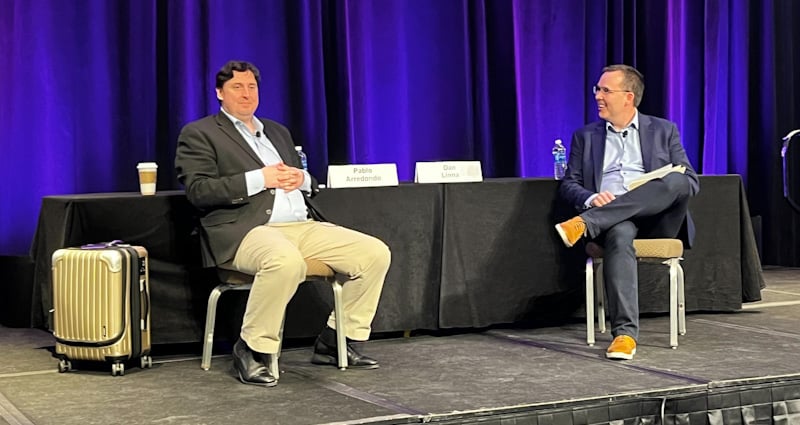The bots are taking over; now what?

Pablo Arredondo (left) and Daniel W. Linna Jr. participated in the "AI Transforming Legal Services: What’s Here, What’s Hype, and Preparing for What’s Coming" panel at the ABA Techshow 2024 on Thursday. (Photo by Danielle Braff)
Technology is taking over legal jobs. It’s zipping through billable hours, slashing legal jobs and flexing its power when it comes to reading documents, summarizing content and researching data.
That may be why lawyers and legal technologists flooded into a Hyatt Regency Chicago ballroom during the second day of the ABA Techshow 2024 on Thursday afternoon to listen to legal academics discuss the future of their careers in a panel called “AI Transforming Legal Services: What’s Here, What’s Hype, and Preparing for What’s Coming.” How worried should they be? Is artificial intelligence a blessing or a curse?
“On one level, the time saved is less billables, and the savings can get pretty incredible,” said panelist Pablo Arredondo, a co-founder of Casetext and a 2017 ABA Journal Legal Rebel.
AI can find specific terms in 2 million documents in two days, as opposed to three months of a human search with just as high a degree of precision, leading to 72% savings in deposition prep, Arredondo said.
But if lawyers have fewer billable hours, how will they earn their income? And how do we measure the quality of AI versus the quality when lawyers are doing the work themselves?
“It’s a beautiful struggle,” Arredondo said.
He wondered whether, ethically, lawyers can still charge $30,000 for the work that 12 associates did taking $1,000 each—when it only takes a single associate a minimal amount of time with the help of a tech review tool.
Simultaneously, a lawyer’s duty to their client is to do the best job at the least expensive cost possible. It’s a conundrum. The legal industry has jumped to the No. 1 most impacted industry when it comes to AI, with 44% of legal tasks in the United States and Europe able to be automated, according to a 2023 study by Goldman Sachs.
“We have a zealous duty to our clients, and our duty to them means that we should,” Arredondo said about using AI tools.
A task that would previously be done by three lawyers could now be done by one—but you’re not going to show up to work and see a robot at your desk—yet, said Daniel W. Linna Jr., a senior lecturer at the Northwestern University Pritzker School of Law.
This is especially applicable to consumer AI, such as ChatGPT. The tech is prone to errors and incorrect information, also known as “hallucinations.”
Follow along with the ABA Journal’s coverage of the ABA Techshow 2024 here.
It’s like relying on someone who is extremely well read but is also a sociopath, argued Arredondo. You would have to make sure that the person never got anywhere near your legal documents, he added.
Linna agreed, adding that while AI raises the game—so we’re going to see more and more content out there—he’s not concerned about its advancement into the legal writing game.
“How do you change the way you write, so that it is concise and well directed?” he asked. “These tools aren’t going to do that for you.”
Well, they aren’t going to do that for you at the moment. Many law firms and law schools are forming committees, making their own chatbots and hiring data scientists to attempt to find the best AI for their purposes.
Linna’s advice is to think about the longer game. Try to find tools to solve specific problems. While AI may be threatening to some firms, which will have to change their model to provide value, once they figure out how to differentiate themselves by rethinking their goals, they may see the value that tech brings.
Scary? For some, but not for all.
Arredondo closed the panel by asking attendees to raise their hand whether they think that this is a cause to be afraid of or whether it’s a cause to rejoice. For those attending the Techshow, apparently, it was a near-unanimous cause to rejoice.



